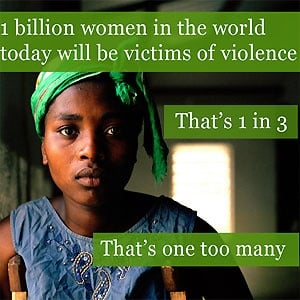
The extent of gender based violence in South Africa is rarely understood. It involves physical and psychological harm, humiliation, mental or sexual harm or suffering, threats of such acts, coercion and other arbitrary deprivations of liberty - and its impact is chilling.
Estimates suggest that violence against women costs South Africa a minimum of R28.4 billion each year. This figure includes health, justice and other service costs as well as lost earnings, revenue and taxes.
There are also second generation costs: children witness and live with violence, and this results in increased juvenile and adult crime.
A decade ago evidence showed that young women between the ages of 16 and 23 who have partners three or more years older than them are 1.5 times more likely to experience violence in their relationships.
There’s been no measurable improvement in the situation since then. Why does South Africa appear to hate its women so much?
Read more: Subtle signs of domestic violence
A violent nation
In Africa, just over 45% of women experience physical or sexual violence. That’s compared to the global average of 35%, though the Africa figure does include at least one active war zone.
In South Africa, a study conducted in three provinces showed that one in four women in the general population has experienced physical violence at some point in their life.
And in Gauteng, South Africa’s most populous province and home to 25% of the country’s population, 75% of men have committed some form of violence against women at some point. This compares to 48% of men in Limpopo, 41% in Kwazulu-Natal and 35% in the Western Cape.
Equally as startling is that up to half of all South African women will be raped in their lifetime.
Rape victims are most likely to be in the 16 to 25 year age group. And girls or women in this age group are four times more likely to become infected with HIV in any year. When they are in relationship with older men, they are also 1.6 times more likely to be HIV positive than women of the same age whose partners are in their peer group.
Read more: How do you report rape when the police don't take you seriously?
Knock on effects
The impact of gender based violence on young girls and women can’t be overestimated. And neither can the extent that violence against women and children in South Africa is accepted, dismissed or downplayed. One study found that 20% of women in the Eastern Cape find violence against women to be acceptable.
The most common response to a young woman whose partner is violent is that she shouldn’t be in a relationship in the first place. The clinic, church and family all respond in this way. As a result there is no support for the girls.
There is also the dynamic that women who are in relationships with men who are three or more years older than them often rely on the man for economic support. This increases the power inequity in a relationship.
But the reality is that gender based violence infringes on women’s rights to freedom. They restrict themselves in going out, in what they wear and how they behave to try and avoid attracting attention that might result in gender based violence. Women are told not to go out alone at night, not to wear certain clothes, not to drink alcohol and not to behave in certain ways otherwise they will be blamed for the violence that might be inflicted on them.
But this is not all. Most of the violence is committed by a known perpetrator. This means women are not even safe in their own homes. Apart from having their freedom restricted and constantly living in fear, intimate partner violence has been shown to cause mental health problems such as depression and substance abuse among women.
Read: Rape within families remains under-reported
What lies behind the stark statistics
Gender based violence is complex in origin. Finding ways to prevent it as equally as complex. There are several drivers that encourage gender based violence to continue. These include:
Patriarchy,
The constant devaluing of women and their contribution to society at all levels, and
Gender stereotyping.
All are prevalent in South African society.
The bill of rights in South Africa’s constitution enshrines the right “to be free from all forms of violence from either public or private sources”. But this means nothing if half the population has its liberty and choices restricted because of gender.
The bottom line is that as a society South Africa has not put enough energy, effort or resources into protecting young girls and women and ensuring that they have the freedom to achieve their potential.![]()
Read more:
Subtle signs of domestic abuse
Men with poor male gender image may be more violent
This article was originally published on The Conversation. Read the original article.




 Publications
Publications
 Partners
Partners










